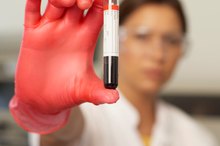Causes of Low Potassium & Low Calcium
Numerous conditions can cause low potassium and low calcium levels. Low levels of potassium in your blood is called hypokalemia, and low levels of calcium in your blood is called hypocalcemia. According to MedlinePlus, hypomagnesemia -- low levels of magnesium in the blood -- can be caused by numerous factors and medical conditions. If you have hypomagnesemia, you may also have low potassium and low sodium levels. In fact, hypokalemia and hypocalcemia are intimately associated with hypomagnesemia.
Malnutrition
Malnutrition can cause decreased potassium and calcium levels. According to the University of Maryland Medical Center, or UMMC, malnutrition occurs when you fail to consume adequate amounts of nutrient-rich food, or if you have a medical condition that impairs nutrient absorption from your food. Malnutrition remains a significant public health problem in many parts of the world, especially among children. The UMMC states that poverty, natural disasters, political upheaval, war and epidemics may all contribute to malnutrition. Common signs and symptoms associated with malnutrition include low potassium and calcium levels, fatigue, depression, weak immune system, increased infections, low red blood cell count, muscle weakness, lung problems and poor skin integrity. According to the UMMC, in most cases, malnutrition can be prevented by consuming a healthy and well-balanced diet.
- Malnutrition can cause decreased potassium and calcium levels.
- According to the University of Maryland Medical Center, or UMMC, malnutrition occurs when you fail to consume adequate amounts of nutrient-rich food, or if you have a medical condition that impairs nutrient absorption from your food.
Hyperaldosteronism
10 Reasons Why Smoking Is Bad
Learn More
Hyperaldosteronism can cause decreased potassium and calcium levels. The National Adrenal Diseases Foundation states that hyperaldosteronism is a disease caused by increased production of the hormone aldosterone. Aldosterone is responsible for sodium and potassium balance within your body. There are two principal types of hyperaldosteronism: primary and secondary. Primary hyperaldosteronism is caused by problems with your adrenal glands, whereas secondary hyperaldosteronism is caused by problems outside your adrenal glands. Common signs and symptoms associated with hyperaldosteronism include low potassium and calcium levels, fatigue, headache, elevated blood pressure, intermittent paralysis, muscle weakness and numbness. According to MedlinePlus, impotence and gynecomastia -- enlarged breasts in men -- are possible complications associated with consumption of spirolactone -- a common medication used to treat hyperaldosteronism.
- Hyperaldosteronism can cause decreased potassium and calcium levels.
- The National Adrenal Diseases Foundation states that hyperaldosteronism is a disease caused by increased production of the hormone aldosterone.
Alcoholism
Alcoholism can cause low levels of potassium and calcium in your body. According to the National Institute on Alcohol Abuse and Alcohol, alcoholism, also known as alcohol dependence, is a common disease that is characterized by four principal features, including the strong need, or urge, to drink, an inability to stop drinking once you have begun drinking, withdrawal symptoms once you stop drinking and the need to drink greater amounts of alcohol to get high. Common signs and symptoms associated with alcoholism include low potassium and calcium levels, depression, nerve damage, brain damage and dementia, memory loss, esophageal bleeding, heart muscle damage, elevated blood pressure, insomnia, sexual dysfunction and pancreatitis. MedlinePlus states that only 15 percent of people with alcoholism seek treatment for this disease.
- Alcoholism can cause low levels of potassium and calcium in your body.
- According to the National Institute on Alcohol Abuse and Alcohol, alcoholism, also known as alcohol dependence, is a common disease that is characterized by four principal features, including the strong need, or urge, to drink, an inability to stop drinking once you have begun drinking, withdrawal symptoms once you stop drinking and the need to drink greater amounts of alcohol to get high.
Related Articles
References
- MedlinePlus: Hypomagnesemia
- "Mineral and Electrolyte Metabolism"; Hypomagnesemic, Hypokalemia and Hypocalcemia; M. Elisaf et al.; 1997
- MedlinePlus: Hyperaldosteronism
- Dylewski JF, Linas S. Variability of potassium blood testing: Imprecise nature of blood testing or normal physiologic changes? Mayo Clinic Proceedings. 2018. 93(5):551-554. doi:10.1016/j.mayocp.2018.03.019
- Friedman PA, Scott CG, Bailey K, et al. Errors of classification with potassium blood testing: The variability and repeatability of critical clinical tests. Mayo Clinic Proceedings. 2018;93(5):566-572. doi:10.1016/j.mayocp.2018.03.013
- Galloway CD, Valys AV, Shreibati JB, et al. Development and validation of a deep-learning model to screen for hyperkalemia from the electrocardiogram. JAMA Cardiology. 2019. 4(5):428-436. doi: 10.1001/jamacardio.2019.0640
- National Heart, Lung, and Blood Institute. Blood tests.
- Ialongo C, Bernardini S. Phlebotomy, a bridge between laboratory and patient. Biochem Med (Zagreb). 2016;26(1):17–33. doi:10.11613/BM.2016.002
- Schmidt ST, Ditting T, Deutsch B, et al. Circadian rhythm and day to day variability of serum potassium concentration: A pilot study. Journal of Nephrology. 2015. 28(2):165-72. doi:10.1007/s40620-014-0115-7
- Chatterjee R, Yeh HC, Shafi T, et al. Serum potassium and the racial disparity in diabetes risk: the Atherosclerosis Risk in Communities (ARIC) Study. American Journal of Clinical Nutrition. 2011. 93(5):1087-91. doi:10.3945/ajcn.110.007286
- Cleveland Clinic. Hyperkalemia (high blood potassium). Updated October 19, 2016.
- Cleveland Clinic. Low potassium levels in your blood (hypokalemia). Updated March 12, 2018.
- Kardalas E, Paschou SA, Anagostis P, et al. Hypokalemia: a clinical update. Endocrine Connections. 2018;7(4):R135-R146. doi:10.1530/EC-18-0109
- Cleveland Clinic. Low potassium levels in your blood (hypokalemia): Management and treatment. Updated March 12, 2018.
- Bnaya A, Ruchlemer R, Itzkowitz E, Gabbay E, Shavit L. Pseudohyperkalemia in chronic lymphocytic leukemia. American Journal of Medicine. 2020;133(2):e52-e53. doi:10.1016/j.amjmed.2019.07.037
- Ben Salem C, Badreddine A, Fathallah N, Slim R, Hmouda H. Drug-induced hyperkalemia. Drug Safety. 2014. 37(9):677-92. doi:10.1007/s40264-014-0196-1
- Cleveland Clinic. How can hyperkalemia (high blood potassium levels) be treated? Updated October 19, 2016.
- Miller KC. Plasma potassium concentration and content changes after banana ingestion in exercised men. J Athl Train. 2012;47(6):648–654. doi:10.4085/1062-6050-47.6.05
- American Association for Clinical Chemistry. Potassium. Updated 12/13/19.
- Jameson JL, et. al. Harrison's Principles of Internal Medicine, 20th Edition. McGraw Hill Education. 2018.
- Kovesdy CP, Appel LJ, Grams ME, et al. Potassium homeostasis in health and disease: A scientific workshop cosponsored by the National Kidney Foundation and the American Society of Hypertension. Journal of the American Society of Hypertension. 2017;11(12):783-800. doi:10.1016/j.jash.2017.09.011
- Nilsson E, Gasparini A, Arnlov J, et al. Incidence and determinants of hyperkalemia and hypokalemia in a large healthcare system. International Journal of Cardiology. 2017;15;245:277-284. doi:10.1016/j.ijcard.2017.07.035
- Pagana KD, Pagana TJ, Pagana TN. Mosby’s Diagnostic & Laboratory Test Reference. 14th ed. St. Louis, Mo: Elsevier; 2019.
- Schrier RW. Renal and Electrolyte Disorders, 8th Edition. LWW. 2017.
- Shrimanker I, Bhattarai S. Electrolytes. in: StatPearls. Updated January 20, 2020.
Resources
Writer Bio
Martin Hughes is a chiropractic physician, health writer and the co-owner of a website devoted to natural footgear. He writes about health, fitness, diet and lifestyle. Hughes earned his Bachelor of Science in kinesiology at the University of Waterloo and his doctoral degree from Western States Chiropractic College in Portland, Ore.









